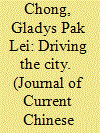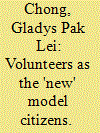| Srl | Item |
| 1 |
ID:
136564


|
|
|
|
|
| Summary/Abstract |
This article examines the ways in which taxi driving and China’s quest for global ascendency are interlinked and enmeshed. Inspired by de Certeau’s The Practice of Everyday Life and his conceptual formulation of “strategy” and “tactic”, this article explores how taxi drivers, through their everyday practice of driving, found ways and moments to tactically challenge and appropriate so-called “civility campaigns” and a rising China. By demonstrating the numerous instances of tactics taxi drivers used, I argue that their socio-economic marginality did not, in fact, reduce them to a “powerless” position. I bring in Foucault’s analytics of power and governmentality to add to de Certeau’s work by helping to explain the intertwined relationship between government and governed to shed light on the complexity implicated in the dynamics of power relations and resistance. I examine the period around the 2008 Beijing Olympics as it involved large-scale attempts to showcase China through (urban) transformation.
|
|
|
|
|
|
|
|
|
|
|
|
|
|
|
|
| 2 |
ID:
104093


|
|
|
|
|
| Publication |
2011.
|
| Summary/Abstract |
Voluntary services and the word 'volunteer' have been discursively highlighted as something 'new' in China in the last few years. The large number of volunteers involved in relief work following the 5/12 Sichuan earthquakes, in the Beijing Olympics in 2008, and in the 2010 Shanghai Expo are examples of this yet understudied phenomenon. This article aims to examine volunteerism and its close relationship with the production of model citizens. It attempts to shed light on how China uses soft power - through appeal and attraction - in its governing strategies. Informed by Foucault's work on governmentality, this article aims to show how promotional strategies and training materials pertaining to volunteering programmes acted as governing strategies that invoked and produced specific power relationships through which the state governed its citizens. Taking the Beijing Olympic volunteer programme as a case to examine how a new model citizenry is produced, I trace three discourses: dream and glory, hosting a great Olympics, and not to 'lose face'. These discourses shape citizens' everyday lives; they help volunteers internalize and embody the ideal of a model citizen, and as such they are part of the organized practices through which subjects are governed in China.
|
|
|
|
|
|
|
|
|
|
|
|
|
|
|
|